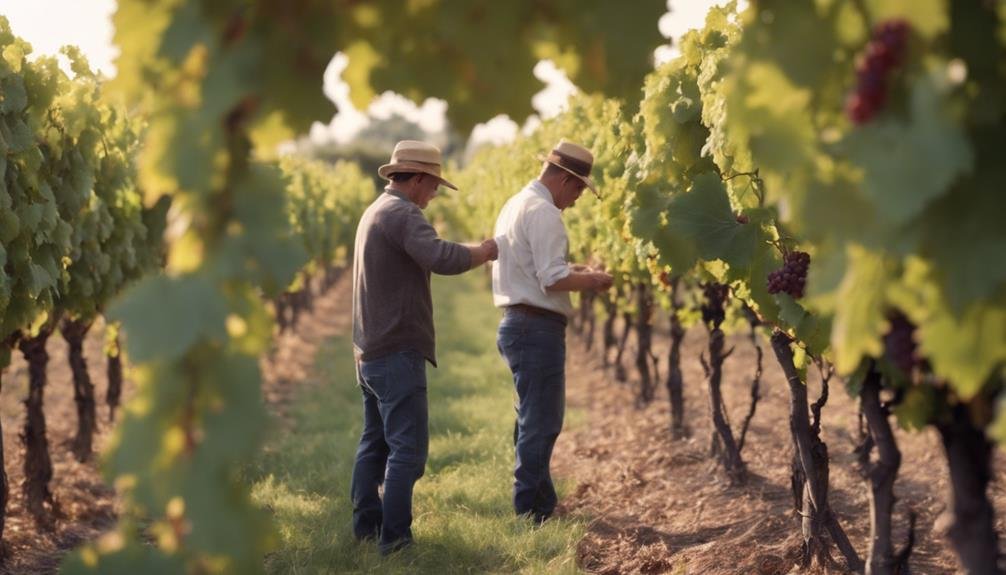Discover a world of unique Native American grape varieties such as Concord, Catawba, and Norton, each with distinctive flavors deeply rooted in winemaking history. While Vitis vinifera grapes dominate, exploring these native varieties reveals new aromatic dimensions. Vitis Labrusca offers musky nuances, while Vitis Riparia's resilience saved vineyards from Phylloxera. Muscadine grapes not only provide antioxidants but also diverse flavor profiles. Norton, a Vitis Aestivalis gem, boasts Midwest resilience and fruity red wines. Reveal hidden treasures in winemaking through the rich tapestry of Native American grapes, each carrying a legacy waiting to be savored further.
Exploration of Native American Grape Varieties
The exploration of native American grape varieties reveals a rich diversity of unique and flavorful options that are often overlooked in the dominant wine industry. These grapes, such as Concord, Catawba, Elvira, Dracut Amber, and Norton, offer distinctive flavor profiles and aromas that have historical importance in winemaking.
Despite their potential, native grape cultivation has been limited due to the dominance of Vitis vinifera in the market. Understanding and appreciating the cultivation practices and aromas of these native grapes can open up new possibilities for winemakers and enthusiasts alike.
Unique Characteristics of Vitis Labrusca
Characterized by a distinctive grape flavor profile renowned worldwide, Vitis Labrusca stands out for its unique aromatic qualities and historical significance in winemaking.
- Known for its distinct flavors that are often described as foxy or musky
- Exhibits strong aromatic profiles reminiscent of wild fruits and flowers
- Concord grapes, a popular strain of V. labrusca, are widely used for their intense aromas
- Varieties like Catawba and Niagara, derived from V. labrusca, offer a spectrum of fruity and floral notes
These characteristics make Vitis Labrusca a valuable and versatile grape variety with a rich heritage in winemaking, contributing to the diversity and complexity of wines produced from native American grapes.
Significance of Vitis Riparia in Wine Industry

Standing as an essential species that played a pivotal role in rescuing the wine industry from the devastation of Phylloxera, Vitis Riparia remains a significant component in vineyard management and grape cultivation practices. This native grapevine species is renowned for its Phylloxera resistance, making it valuable for grafting onto V. vinifera vines to combat this destructive pest. Particularly prevalent in Midwest vineyards, V. riparia contributes to the resilience of grapevines against Phylloxera infestations, ensuring the sustainability of vineyards in these regions. Its ability to thrive in diverse conditions and its compatibility for grafting have solidified its position as an important element in modern viticulture practices.
| Significance of Vitis Riparia | |
|---|---|
| Phylloxera resistance | Midwest vineyards |
| Grafting | V. riparia |
Health Benefits of Vitis Rotundifolia
With a growing interest in the unique qualities of Vitis Rotundifolia, the focus now shifts to exploring the health benefits associated with this particular grape variety.
- Muscadine grapes provide antioxidant benefits that can help protect cells from damage.
- Muscadine flavors offer a distinct taste profile, ranging from floral and fruity to earthy and spicy notes.
- Consuming Muscadine grapes rich in ellagic acid may aid in reducing inflammation and promoting heart health.
- The primarily sweet Muscadine wines are not only enjoyable but also potentially beneficial for overall well-being.
Norton: a Key Vitis Aestivalis Variety

Norton, a prominent variety of Vitis Aestivalis, has garnered recognition for its distinctive characteristics in the winemaking industry. Known for its legacy in producing red wines with fruity flavors, Norton is a Midwest marvel.
Thriving in the heart of the Midwest, particularly in Missouri, Norton grapes are praised for their high acidity and fruity notes, making them an essential component of the region's winemaking culture. The robust nature of Norton's vines allows them to withstand the challenges of the Midwest climate, resulting in wines that embody the unique terroir of the area.
With a rich history and a reputation for quality, Norton continues to be a key player in shaping the wine landscape of the Midwest.
Frequently Asked Questions
Are There Any Famous Wineries Currently Using Native American Grape Varieties?
Famous wineries increasingly embrace native American grape varieties, aligning with sustainability and showcasing cultural significance. Their adoption not only diversifies the wine industry but also supports economic impact by preserving heritage and promoting unique flavors.
How Do Native American Grapes Compare to Traditional European Wine Grapes?
Native American grapes offer unique flavor profiles and adaptability to diverse growing conditions. While traditional European wine grapes dominate markets, native varieties showcase distinct aromas. Understanding and demand for these grapes may enhance winemaking techniques.
What Are the Challenges in Cultivating and Harvesting Native American Grape Varieties?
Challenges in cultivating and harvesting native American grape varieties include sustainability concerns, limited research hindering innovation, unique growth characteristics requiring specialized cultivation techniques, and low demand affecting cultivation efforts. Overcoming these obstacles requires dedicated study and innovative approaches.
Are There Any Upcoming Research Projects Focused on Native American Grape Varieties?
Research collaborations are underway to explore genetic diversity and conservation efforts of native American grape varieties. Funding opportunities are being pursued to support upcoming projects dedicated to studying and promoting these hidden treasures.
Can Native American Grape Varieties Be Used to Create High-End Wines for Connoisseurs?
Exploring the potential of native American grape varieties for high-end wines presents a unique opportunity to showcase their distinctive flavors. With their understudied qualities and unique growth characteristics, these grapes hold promise for connoisseurs seeking new and exceptional wine experiences.
Conclusion
To sum up, delving into the hidden treasures of Native American grape varieties reveals a diverse tapestry of flavors, aromas, and health benefits waiting to be discovered.
As the saying goes, 'Don't judge a book by its cover,' these lesser-known grapes may hold the key to revealing new and exciting possibilities in the world of wine.
Embracing the diversity and unique characteristics of these indigenous varieties can enrich the wine industry and provide a deeper appreciation for the heritage they represent.
